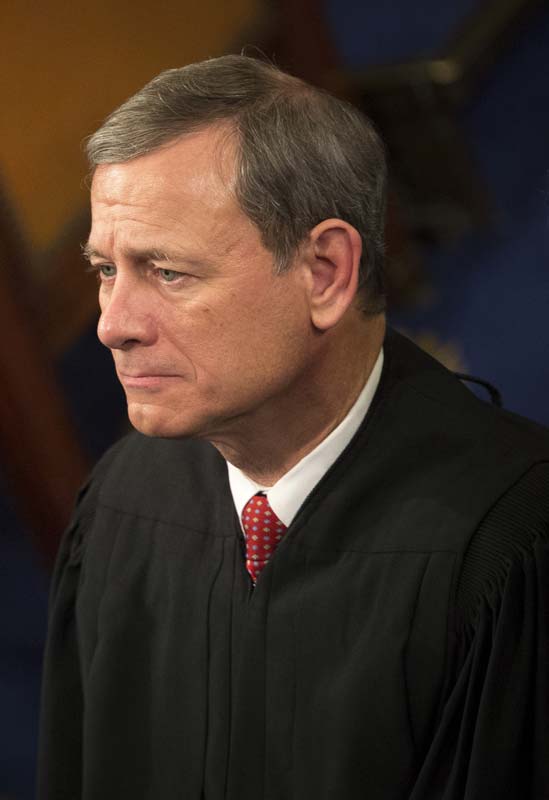 Drew Angerer for Bloomberg
Drew Angerer for Bloomberg
"Every time I attend a case, I walk away with the impression - I can say this, you can't - that at least one branch of government works," Lipson said. "It's very impressive."
"Well, you're right," Roberts replied to laughter. "I can't."
That sentiment - that Congress and the executive branch weren't fulfilling their obligations - nonetheless ran as an undercurrent to Roberts' remarks during the hour-and-a-half long discussion. He explicitly lamented that the court's decisions had come to be seen as inherently political, a function of the "politically polarized environment" in which we live, but also a function of the legislative and executive branches leaving a broad range of decisions to the justices.
He offered the example of Massachusetts v. Environmental Protection Agency, a 2006 decision in which the court determined that the EPA could regulate greenhouse gases as pollutants under the Clean Air Act of 1970.
"You would have hoped that some time between 1970 and 2010, the politics branches had addressed that very important question," Roberts said. Because they had not, the decision was left up to the court.
"When we come out with the opinion that said, yes, greenhouse gases can be regulated as a pollutant, it would be very reasonable for the man on the street to say the Supreme Court decided to regulate greenhouse gases," Roberts said. "When all we were doing is saying, 'This is what "air pollutant" meant when Congress passed the statute.'"
"We do seem to be getting more and more involved in every aspect of society in a way that would have been surprising to the framers of the Constitution," Roberts said at another point.
Asked about his comments last year rejecting the idea that the court operated on partisan lines, Roberts again suggested that such misconceptions were a function of the same partisan politics which gridlock the legislative branch.
"When you live in a politically polarized environment, people tend to see everything in those terms," he said of assumptions that votes would break down along Republican appointee-Democratic appointee lines. "That's not how we at the court function and the results in our cases do not suggest otherwise."
He compared their work to the overtly political decision-making on Capitol Hill.
"People tend to think that our role is similar to the role of the political branches. That, for example, when we issue a decision coming out a particular way, it's because we like what we are upholding," Roberts said. "That we particularly like the result and that we're voting for that. There isn't a lot of basic understanding that we're interpreting law. And on a regular basis we're upholding policies with which we don't agree."
Roberts' frustrations, though obvious, were layered with an insistence on the separation of the branches of government. At the outset, he explained the three layers of humility he applied to his work: Awareness of his peers, awareness of history - and awareness of the other branches of government.
"I am extremely conscious as I go about my job assessing acts of Congress for constitutionality, reviewing executive actions for the same, that the political figures in our government have been elected by hundreds of thousands of people - by millions of people - and they earn by that charter the authority to shape policy for the government," Roberts said. "I have been elected by nobody."
At one point, the audience seemed to anticipate that Roberts would make an even more pointed reference to the executive branch.
"Before I sit down with Rabbi Lipson I'd like to reflect for just a moment on the calendar," he said, as he began his comments. "I do not think that those responsible for inviting me here tonight knew that today."
The audience interrupted with applause and laughter, apparently expecting Roberts to refer to House Speaker Nancy Pelosi's own exercising of Congress' constitutional powers.
That wasn't Roberts' point, though. Apparently Sept. 24 is a day on which a number of other justices were nominated to their positions.
Sign up for the daily JWR update. It's free. Just click here.
(COMMENT, BELOW)


 Contact The Editor
Contact The Editor
 Articles By This Author
Articles By This Author